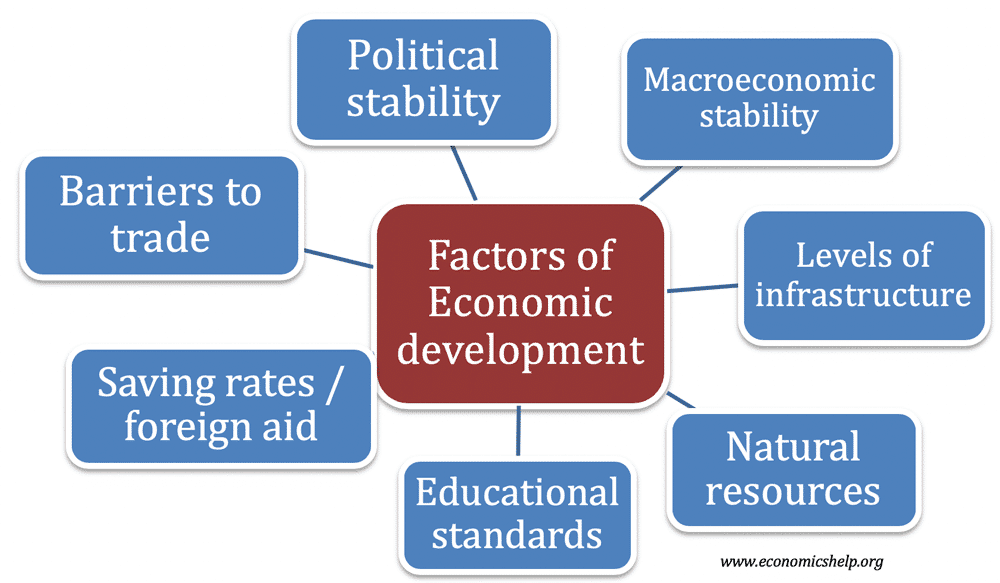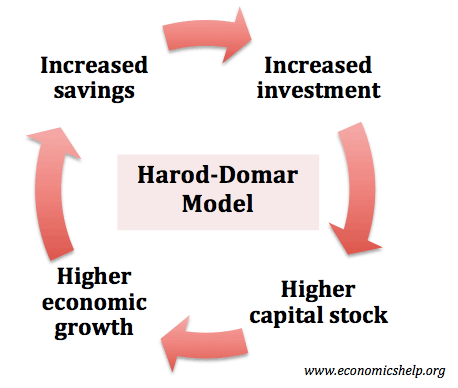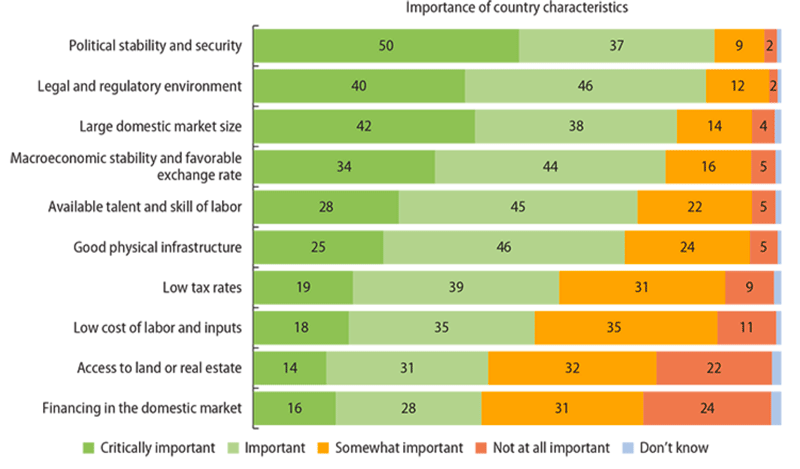What Are the Factors That Contribute to the Development of Industry
Economical evolution implies an improvement in economic welfare through higher existent incomes and other welfare indices such as improved literacy, better infrastructure, reduced poverty and improve health care.
Economical development requires a degree of political stability, investment and mixture of public and private initiatives to increase economic potential.

The master factors affecting economical evolution include
- Levels of infrastructure – e.g. transport and communication. In recent years, economical development in Cardinal Africa has been improved due to increased investment in roads, railways and seaports. Role of this investment has come from Chinese companies who accept a vested interest in transporting raw materials from Africa to China.
- Education. Levels and standards of education accept a significant influence on labour productivity. Without basic literacy and numeracy, it is hard for an economy to develop from manual labour to new higher tech industries in the service sector. For example, proficient levels of education in India have given opportunities for growth in service industries, such as Information technology and call centres.
- Levels of inward investment. Developing countries that can attract inward investment tin can see meaning growth in development due to higher levels of capital and benefits of attracting multinational companies into their economic system. For newly industrialised countries (NICs), inward investment has played a significant part in increasing economical development. For instance in 2011, inwards investment in Brazil stood at $101bn.
- Levels of savings/capital In growth models, such as Harod Domar, levels of savings and majuscule are seen as a key factor in determining economical growth. Higher savings enables a virtuous circle of increased investment, higher growth, and therefore, higher savings.

- Political stability / Law and club. Political stability and the protection of private property was ranked as the most important factors for encouraging firms to invest in developing economies. Any sign of instability increases the economical and personal risk of investing in developing countries.

The biggest block to evolution is prolonged civil unrest/armed services conflict equally this causes investment to dry upwards and resources to be wasted in unproductive means.
- Macroeconomic stability. Similar to political stability, macroeconomic stability encourages investment and evolution. This involves low rates of inflation and commutation rate stability. Rapid devaluation can crusade capital flight and a turn down in growth.
- Labour mobility. Is labour able to motion from relatively unproductive agriculture to more productive manufacturing?
- Strange help. Targeted aid, can help improve infrastructure and living standards. Information technology can be important for developing economies with low levels of savings and capital investment. Assist depends on how it is used – whether it is tied to merchandise deals or used to overcome market failure in areas such as education and health care. There is also some criticism of foreign help that it can influence incentives and
- Regional effects. Economic development is strongly influenced by the evolution of an economies neighbours. For example, in the 1980s and 1990s, south due east Asia showed strong levels of economic growth and evolution. Nonetheless, Sub-Saharan African countries experienced very slow growth. This is partly due to the gravity upshot – the theory that trade is near profitable and efficient with near neighbours. If a neighbour does well, at that place tends to be spill over effects, such as increased trade and increased investment.
- Natural resources. Ceteris paribus countries with higher levels of natural resources tin can use this for economic development. For case, the revenues gained from oil have enabled the Gulf states to develop rapidly gaining high levels of real Gross domestic product. For African and Asian countries, raw materials are an important source of acquirement and export earnings which enables college evolution.
- However, the link between natural resource and development is not straightforward. 1 theory suggests raw materials can lead to a 'resource curse' where an economy is stuck in producing master products with no incentive to diversify the economy. Information technology can besides depend on whether natural resources are owned by developing economy and really filter through to different sections of social club.
- Tax rates and levels of abuse – e.yard what percentage of tax rates are actually nerveless and spent on public services. For foreign multinationals, a low revenue enhancement rate may exist important to encourage investment. However, at that place needs to exist a balance every bit the regime need to collect tax to fund public services and public infrastructure.
- Free trade vs protectionism. An of import debate in economical development is betwixt the benefits of free trade versus protectionism. Removal of tariff barries can lead to a rising in exports, which contribute towards economic development. Asian countries, such as Korea, Taiwan and China have all benefitted from removal in tariffs. However, for developing economies stuck in producing main products (where they have static comparative reward) there is a potent case for temporary tariffs to enable new infant industries to develop.
- Tourism. For developing economies with an attractive climate and environs, tourism can be an important source of strange earnings and incentive to develop infrastructure and new hotels.
Evaluation – other possible factors that influence economic development
- Culture of entrepreneurship. For example, in the by 20 years, Bharat has seen a shift from a conservative religious society to a more secular society with a greater focus on textile improvement.
- Political system. Some argue a Control economy can pb to economic stagnation, e.grand. Cuba. Cathay has successfully managed a partial economical shift to free-market place based economy (with still political control of Communist Party)
- Regulation/free market system. Gratuitous marketplace economists, such as Milton Friedman contend the openeness of an economic system is of import. For instance, privatisation and deregulation, reduces barriers to invesment and economical growth.
Related
- Policies for Economic Development
- Economic Growth and Economic Development
- Economic Development and Tourism
You tin can read more at our privacy page, where y'all tin can change preferences whenever you lot wish.
piercetherroys1972.blogspot.com
Source: https://www.economicshelp.org/blog/147654/economics/factors-affecting-economic-development/
0 Response to "What Are the Factors That Contribute to the Development of Industry"
Post a Comment